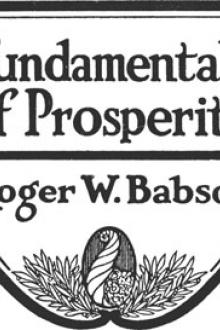Fundamentals of Prosperity
Fundamentals of Prosperity
What They Are and Whence They Come
Book Excerpt
industry. The real purpose of the study was to discover some industry or some man that could be helped greatly through national advertising. In connection with that study of those captains of industry, I tabulated their ancestry. These were the seventy greatest manufacturers, merchants and railroad builders, the leading men who have made America by developing the fields, the forests, the mines and the industries. What did I find? I found that only five per cent. of these captains of industry are the sons of bankers; only ten per cent. of them are the sons of manufacturers; fifteen per cent. of them are the sons of merchants, while over thirty per cent. of them are the sons of poor preachers and farmers.
Why is it that ministers' sons hold a much more important place in the industrial development of America than the sons of bankers? The ministers' sons inherit no wealth, they have no more than their share of college education; they are not especially religious as the world measures religion. In fact, t
Editor's choice
(view all)Popular books in Non-fiction
Readers reviews
2.0
LoginSign up
This book started out great and was very inspiring at first. The premise of the book is that prosperity doesn't come from wealth, education, or an abundance of natural resources, but rather it comes from the human spirit; to which I agree. He went on to say that prosperity comes from God and that we should seek God first; to which I also agree.
Toward the end of the book however, he departs from sound logic by devoting an entire chapter to his idea that all churches in America should be reorganized so that they have rotating preachers each of which preaches only on his area of expertise and that the message being taught should be one of prosperity. This book, written in 1920, may have been the beginnings of the prosperity gospel so prevalent today.
Babson seems to suggest, in the second half of the book, that the purpose of the church is in teaching people how to become prosperous, rather than in teaching people to have a relationship with Christ.
The prosperity gospel is, of course, false because it cannot be applied to everyone equally. A boy in India who lives in a grass hut and has to walk five miles each day just to collect drinking water from a polluted river will not, by applying biblical principals to his life, find himself moving into a three bedroom condo with running water. Mr. Babson seems to overlook this simple fact.
Toward the end of the book however, he departs from sound logic by devoting an entire chapter to his idea that all churches in America should be reorganized so that they have rotating preachers each of which preaches only on his area of expertise and that the message being taught should be one of prosperity. This book, written in 1920, may have been the beginnings of the prosperity gospel so prevalent today.
Babson seems to suggest, in the second half of the book, that the purpose of the church is in teaching people how to become prosperous, rather than in teaching people to have a relationship with Christ.
The prosperity gospel is, of course, false because it cannot be applied to everyone equally. A boy in India who lives in a grass hut and has to walk five miles each day just to collect drinking water from a polluted river will not, by applying biblical principals to his life, find himself moving into a three bedroom condo with running water. Mr. Babson seems to overlook this simple fact.
- Upvote (0)
- Downvote (0)

 Free Download
Free Download
























-itok=vcKIB5v1.jpg)